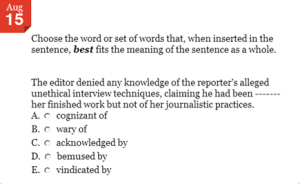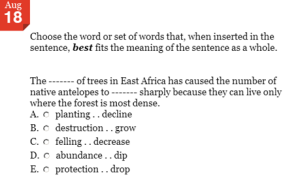The SAT is broken up into three parts: Critical Reading, Mathematics, and Writing. Test day starts with an essay, 3 Mathematics sections, 3 Reading sections, and 2 Writing sections. More out of necessity than anything, most, if not all, SAT prep begins with Critical Reading, because vocabulary takes the most time to learn.
The Critical Reading section of the SAT has four types of questions: Sentence Completions, Short Passages, Long Passages, and Passage Comparisons. This article will cover the basics of sentence completion.
Sentence completion questions are found at the beginning of every Critical Reading section. They contain either one or two empty lines within a few sentences, and require you to pick the best word or set of words that fit those blanks. Here is a one-blank Sentence Completion question.

Here is a two-blank Sentence Completion question.

There are several ways to go about solving these types of problems, such as inferring from context clues, decomposing the answers into prefix-root-suffix, and the positive-negative game. However, the only way to be one hundred percent sure that your answer is the right answer is to know the actual words. That is where SAT vocabulary comes in.
SAT vocabulary is either a blessing or a curse depending on what type of student you are. For those that have a good memory, hardly any effort is needed to remember definitions. For those that despise rote learning, it can leave a sour taste in the mouth after countless nights of staring at flash cards. Yet, the truth is, vocabulary is an easy score booster on the Critical Reading section. All you have to do is memorize some words and definitions, and the first six-eight questions on the Critical Reading sections will start looking a lot more like English and a lot less like Egyptian hieroglyphics; there is no reason not to study vocabulary!
So, where do you start? Several organizations have compiled their own list of “most common” SAT vocabulary words. I recommend beginning with a lightweight set of the 500 most common SAT words http://quizlet.com/374483/the-500-most-common-sat-words-flash-cards/. Focus on committing the definitions to memory. By no means should you tackle all of this head-on. Break the list up into 10-word section and study one section each day. Try using them in your conversations, and incorporate them in your essays for your English class. The more you use them, the more familiar they will appear on test day.
For most students, the set of 500 will be enough to prepare them for the SAT Critical Reading section. Unfortunately, sometimes the words on actual SAT may not necessarily be all from the vocabulary you study. It is a bit of a random lottery. However, the more words you do know, the higher the chance you have to get a good score. So if you can get the 500 set ingrained in your memory prior to your SAT test date, it is worth considering trying to learn more vocab. It can never hurt! A simple google search for “SAT vocab” will yield more definitions to study.
Start studying. Whenever you push off your nightly SAT vocab study session, remember Benjamin Franklin’s advice, “you may delay, but time will not.” The SAT is coming whether you like it or not.

